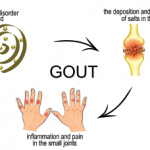Serum uric acid (UA) is an important factor in the causal pathway for gout. It has also been implicated as a potential risk factor and/or mediator of cardiovascular disease outcomes and mortality in a large number of observational studies. Although many of the clinical trials targeting serum UA reduction have focused on pharmacologic interventions, diet has long been identified as an important determinant of serum UA level. However, much of the dietary evidence on serum UA reduction is derived from observational studies. Prior intervention studies have focused on isolated micro-nutrients, such as vitamin C, or food types, such as dairy products. It remains unknown whether adopting a healthful diet might effectively lower serum UA.
Objective: The authors undertook this study to examine the effects of the dietary approaches to stop hypertension (DASH) diet and levels of sodium intake on serum UA.
Methods: The researchers conducted an ancillary study of a randomized, crossover feeding trial in 103 adults with prehypertension or stage I hypertension. Participants were randomly assigned to receive either the DASH diet or a control diet (typical of the average American diet) and were further fed low, medium and high levels of sodium for 30 days, each in random order. Body weight was kept constant. Serum UA levels were measured at baseline and following each feeding period.
The DASH diet emphasizes whole grains, fruits, vegetables and low-fat dairy products with a low intake of red meats, sweets and saturated fats. Thus, the DASH diet encompasses many of the elements known to be inversely associated with hyperuricemia and gout, such as lower purine content, higher dairy content and higher vitamin C intake with fruits.
Results: During the control diet, low sodium intake was associated with an increase in UA from baseline (0.4 mg/dL; P<0.001). Meanwhile, during the DASH diet, high sodium intake was associated with a reduction in UA from baseline (20.3 mg/dL; P=0.01).
The DASH diet was associated with significantly lower serum UA during both low (–0.53 mg/dL; P=0.03) and medium (–0.56 mg/dL; P=0.03) sodium intake and with a nonsignificant reduction in serum UA levels during high sodium intake (–0.33 mg/dL; P=0.18). There was no evidence of effect modification by diet on the relationship between sodium level and UA level. Overall, the DASH diet reduced serum UA compared with the control diet (–0.35 mg/dL [95% confidence interval –0.65, –0.05], P=0.02).
Regardless of diet, medium sodium intake significantly reduced serum UA compared with low sodium intake (–0.35 mg/dL for the DASH diet, P=0.04; 20.33 mg/dL for the control diet, P<0.001). Similarly, compared with low sodium intake, high sodium intake significantly reduced serum UA (–0.33 mg/dL for the DASH diet, P=0.003; –0.53 mg/dL for the control diet, P<0.001). Overall, when aggregated across both diets, compared with low sodium intake, medium sodium intake lowered serum UA (–0.34 mg/dL; P<0.001), and high sodium intake lowered serum UA (–0.43 mg/dL; P<0.001). There was no significant difference between high and medium sodium intake across both diets (–0.09 mg/dL; P=0.31).


